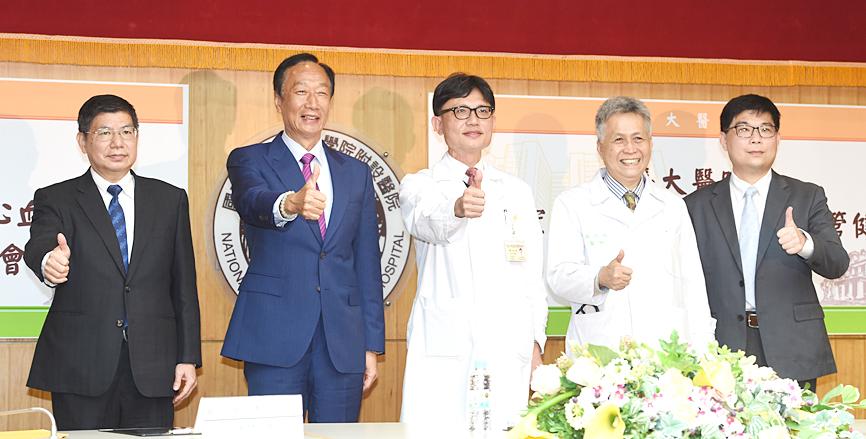Air pollution can harm the cardiovascular health of young people, researchers at National Taiwan University Hospital said yesterday as they presented their latest study.
The study — which involved 755 Taiwanese aged 21 years on average — revealed a link between exposure to airborne pollutants and the thickening of the carotid arteries’ inner walls, the research team told a news conference in Taipei.
This thickening of arterial walls is correlated with increased risk of heart attack later in life, said Su Ta-chen (蘇大成), director of the hospital’s oDepartment of Environmental and Occupational Medicine.

Photo: Liu Hsin-de, Taipei Times
Airborne particulate matter smaller than 2.5 micrometers carries many substances released by internal combustion engines, including zinc, copper, iron and sulfur, which could cause the thickening, he said.
Butadiene — another air pollutant common in cities — is a volatile organic compound that can thicken carotid walls, harden blood vessels, increase cholesterol levels and damage the DNA within cells, he said, adding that this substance is released by vehicle engines and tires.
“Our data — which show that air pollution is increasing health risks for young people — should be viewed as an alarm sign,” he said.
“Young people are like canaries in the coal mine” for the population at large, he added.
Environmental and health authorities should monitor butadiene levels as part of their efforts to rein in harmful pollution in cities, he said.
The research team in an earlier study found that urban air pollution is linked to indicators of poor respiratory health in Taiwanese adults, including inflammation metrics, coagulation factors and arrhythmia, he said.
Hon Hai Precision Industry founder Terry Gou (郭台銘) told the news conference that last year he developed light arrhythmia due to air pollution.
Taiwanese should hold local government heads responsible for air quality in their region in the local elections in November, Gou added.

Chinese spouse and influencer Guan Guan’s (關關) residency permit has been revoked for repeatedly posting pro-China videos that threaten national security, the National Immigration Agency confirmed today. Guan Guan has said many controversial statements in her videos posted to Douyin (抖音), including “the red flag will soon be painted all over Taiwan” and “Taiwan is an inseparable part of China,” and expressing hope for expedited reunification. The agency last year received multiple reports alleging that Guan Guan had advocated for armed reunification. After verifying the reports, the agency last month issued a notice requiring her to appear and explain her actions. Guan

GIVE AND TAKE: Blood demand continues to rise each year, while fewer young donors are available due to the nation’s falling birthrate, a doctor said Blood donors can redeem points earned from donations to obtain limited edition Formosan black bear travel mugs, the Kaohsiung Blood Center said yesterday, as it announced a goal of stocking 20,000 units of blood prior to the Lunar New Year. The last month of the lunar year is National Blood Donation Month, when local centers seek to stockpile blood for use during the Lunar New Year holiday. The blood demand in southern Taiwan — including Tainan and Kaohsiung, as well as Chiayi, Pingtung, Penghu and Taitung counties — is about 2,000 units per day, the center said. The donation campaign aims to boost

The Kaohsiung Tourism Bureau audited six hotels in an effort to prevent price gouging ahead of Korean band BTS’ concert tour in the city scheduled for Nov. 19, 21 and 22 this year. The bureau on Friday said that the audits — conducted in response to allegations of unfair pricing posted on social media — found no wrongdoing. These establishments included the local branches of Chateau de Chine, Hotel Nikko, My Humble House, and Grand Hai Lai, it said, adding that the Consumer Protection Commission would have penalized price gougers had the accusations been substantiated. The bureau said the Tourism Development Act

BACK TO WINTER: A strong continental cold air mass would move south on Tuesday next week, bringing colder temperatures to northern and central Taiwan A tropical depression east of the Philippines could soon be upgraded to be the first tropical storm of this year, the Central Weather Administration (CWA) said yesterday, adding that the next cold air mass is forecast to arrive on Monday next week. CWA forecaster Cheng Jie-ren (鄭傑仁) said the first tropical depression of this year is over waters east of the Philippines, about 1,867km southeast of Oluanpi (鵝鑾鼻), and could strengthen into Tropical Storm Nokaen by early today. The system is moving slowly from northwest to north, and is expected to remain east of the Philippines with little chance of affecting Taiwan,